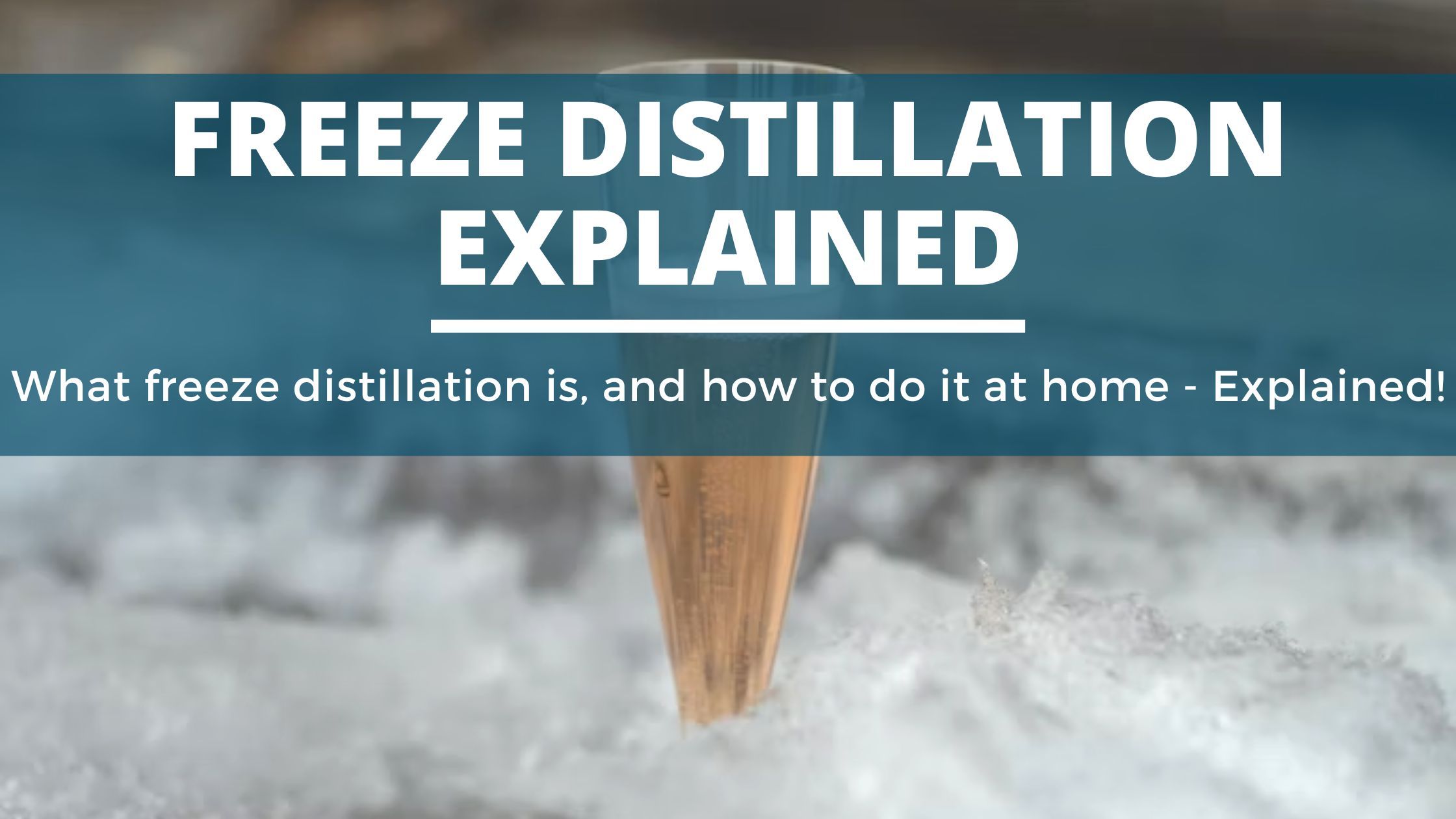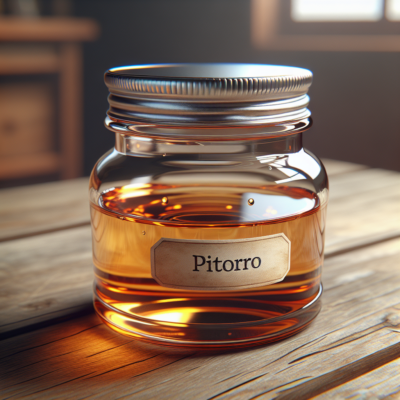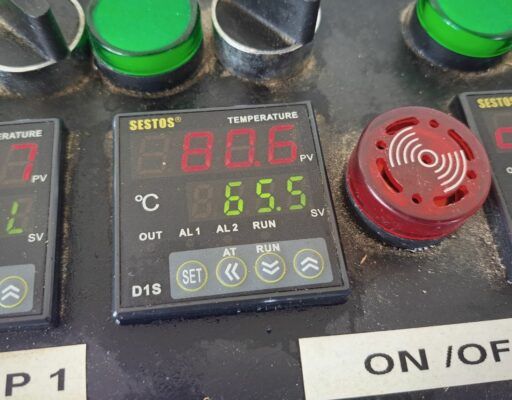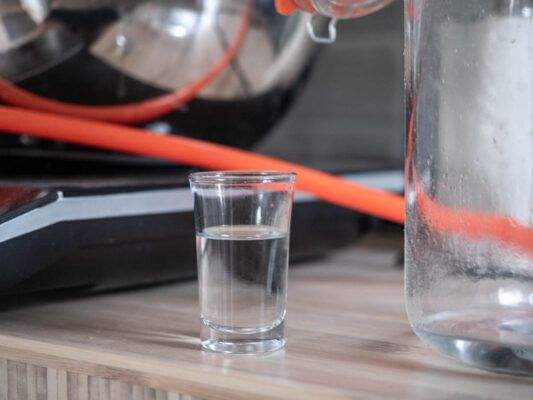Distilling, Distilling 101
Freeze Distillation (Try This!)
Distilling with a alembic or column still is awesome, but you need a lot of expensive equipment, and it’s unfortunately still illegal in many parts of the world.
So what can you do instead?
Freeze distillation is the process of lowering the temperature of your liquor until the water component freezes but the alcohol stays as a liquid, then decanting the alcohol and discarding the ice. This method concentrates the compounds of the liquor, resulting in an enhanced ABV and flavor.
It works best with already distilled alcohol, but it can also be done with beer, wine or even cider
Ready to try freeze distillation at home? Let’s dive in!
Table of Contents
How Does Freeze Distillation Work?
Freeze distillation is a method of distilling alcohol simpler than you would if you were using distilling equipment.
- While Defrosting:
This is the most traditional method. It works by lowering the temperature (freezing) of your alcoholic beverage, and the liquid with the lowest freezing point (ethanol) melts more quickly than water.
Once defrosted, the alcohol is separated from the ice water, and the resulting product is an intensely potent and flavorsome drink. - While Freezing: This is another way that also works. Here you start freezing the mixture and discard the ice off the top of the container as it starts to form.
The freezing point of fractions
Freeze distilling is only possible because ethanol and water have different freezing and boiling points. These are known as fractions.
Ethanol freezes at -114°C (-173°F). Since home freezers only have a freezing point of 0°C (32°F), pure ethanol would remain liquid when placed in the freezer.
But low-ABV liquors like wine, beer, and cider have low freezing points suited for the home freezer, so they work well for freeze distillation.
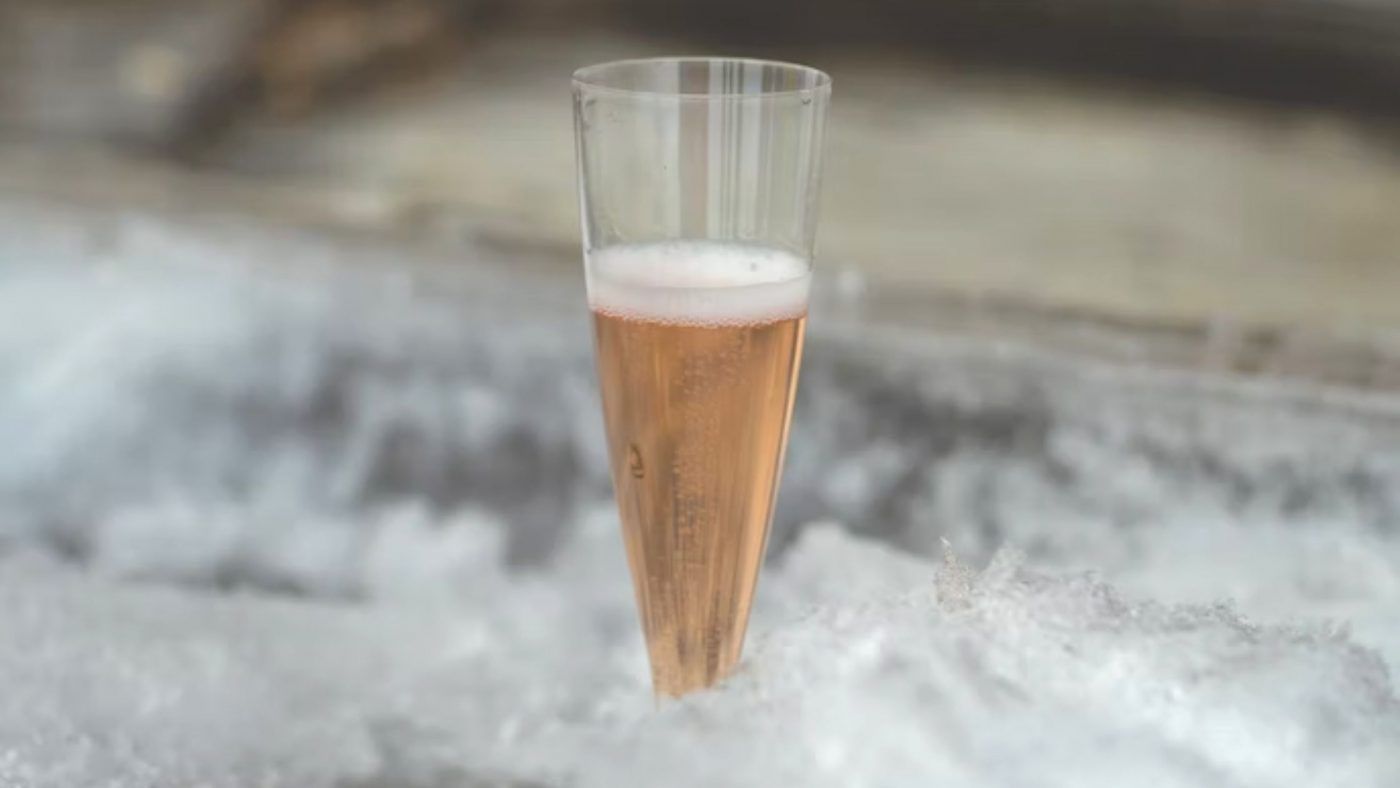
Is Freeze Distilling Safe?
Freeze distilling is inherently more dangerous than still distillation. When using a still to purify your alcohol, the heat strips off most impurities, leaving behind pure alcohol. Also, when heat distilling, you’re in a better position to make cuts and separate the different fractions of your distillate.
But in the case of freeze distillation, you’re concentrating all the impurities together with the pure alcohol. And when the alcohol melts, the only component that remains in solid form is water. Here’s a deeper explanation of the possible dangers surrounding freeze distillation.
1. The methanol concentration
The primary purpose of freeze distillation is to increase the alcohol by volume of your original alcohol. If there’s methanol in the initial product, the methanol content increases as well. Excess methanol metabolizes into formaldehyde in your body, creating formic acid.
Formic acid causes symptoms similar to overindulgence in alcohol – headaches, vomiting, and uncoordinated movement. But if left untreated, they can become severe and lead to:
- blindness
- coma
- death
Read More: about the dangers of methanol poisoning here
2. Hangovers from freeze distilling
Increased concentration of impurities -fusel oils, acetone, can lead to intense hangovers. One common side effect of drinking freeze-distilled apple cider (apple jack) is apple palsy.
Apple palsy is extreme intoxication resulting in intense hangovers and severe headaches from consuming a concentrated alcoholic beverage compared to your primary liquor.
How to Freeze Distill Alcohol (Step-by-step Guide)
Now that you’re aware of befifs (and the dangers) of freeze distilled alcohol, you might be wondering: how do I make my own? Before we give you the finer details, we advise that you use only an already-distilled alcoholic beverage.
But, on a fun note, prepare yourself for a highly intensified beverage with lots of flavors. So, here goes: How to freeze distill alcohol.
What you’ll need
- 2 liter (67oz) plastic bottle or container that’ll allow for expansion
- 750ml (25oz) wine/beer/cider
- Funnel
How to Freeze Distill Wine
Here’s how to enhance the notes and legs in your wine.
- Pour your wine into the bottle and seal the top with the lid.
- Place the container in the freezer.
- Allow the wine to freeze for 24 hours (or until it’s completely frozen).
- Remove the wine from the freezer and let it defrost in the fridge.
- As the wine melts, pour it into a glass jar.
- Check the wine every 15-30 minutes and repeat step 5. Do this until a white ice block remains.
How to freeze distill beer
If you’ve felt like standard beer tastes watery and could do with a flavor lift, freezing it will fulfill your desires. This method produces a thick, sweet barley taste. Here’s how to freeze distill beer.
- Pour the beer into the bottle and seal the top with the lid.
- Place the bottle in your freezer.
- Wait 24 hours, then place the bottle in the fridge.
- When the beer starts to melt, pour it into a glass jar.
- Check the beer every 15-30 minutes and repeat step number 4. Do this until a block of white ice remains.
How to freeze distill cider
Freeze-distilling cider turns the alcohol into the legendary applejack. Here’s how to freeze distill cider.
- Pour the cider into a bottle.
- Place the bottle in the freezer for 24 hours, or until completely frozen.
- Defrost the beverage in the fridge.
- Pour the cider into glass jars.
- Check the beer every 15-30 minutes and repeat step number 4. Do this until a block of white ice remains.
NOTE: You can freeze distill your alcohol until the alcohol won’t freeze anymore.
Freeze Distilling FAQ
Q. Is Freeze distilling legal?
Freeze-distilling undistilled alcohol is illegal because it concentrates all the impurities found in fermented beverages. This is a health hazard since you’ll be consuming methanol and fusel oils unsafe for human consumption.
If freezing previously distilled alcohol, you should be safe because you’re merely concentrating an already distilled alcohol -selling it is illegal unless you have a license to trade alcohol.
Q. Can you remove the heads with freeze distilling?
You cannot remove heads with freeze distilling. When the alcohol is frozen, all impurities will be bound together. So, when you pour out the melted liquid for consumption purposes, you’ll also pour out the heads.
Compared to heat distillation, you’re not at liberty to make cuts. Therefore, you can’t dispose of any bad stuff you don’t want. If you’re worried about heads when freeze distilling, it’s best to use an already distilled alcohol.
Q. Does distilled water freeze?
Distilled water does freeze. In fact, it freezes much quicker than tap water because it doesn’t contain chemicals that would reduce the rate at which tap water turns to ice. So, if you’re using a home freezer that can reach adequate freezing points of 0°C (32°F), distilled water will freeze.
Conclusion
Freeze distilling isn’t a new concept. It’s one of the techniques moonshiners applied to enhance their alcohol by volume during the prohibition era.
Though safety concerns remain, home distillers have found a way to safely freeze distill their alcohol – with the worst-case scenario being throbbing headaches the following day.
You can freeze distill wine, cider, beer, or any liquor that can turn into ice in your home freezer. But, when you try this method, always use distilled alcohol.

